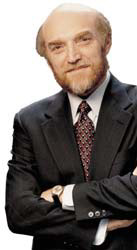Viewpoints: Hate, Not Politics, Drives the New Terrorism
By Walter Reich
As we create new governmental structures to protect us from terrorism, we should make sure that our leaders understand what terrorism now is and how they can—and cannot—protect us from it. What terrorism was it is no more. Political agendas once drove it. What drives it now is hate. This revolution in terrorism demands nothing less than a revolution in how our government understands and responds to it.

 |
|
Walter Reich is the Yitzhak Rabin Memorial Professor of International Affairs, Ethics, and Human Behavior at The George Washington University and the editor of “Origins of Terrorism: Psychologies, Ideologies, Theologies, States of Mind.” He was the director of the U.S. Holocaust Memorial Museum from 1995 to 1998, and has just been reappointed as a senior scholar at the Woodrow Wilson Center for Scholars.
Photo: Breton Littlehales/USHMM
|
That the country’s anti-terrorism apparatus doesn’t appreciate this revolution even after Sept. 11—and is still responding to it as if it was politics that drove it and as if only terrorist networks carried it out—was reflected in the FBI’s initial response to the July 4 shootings at the El Al ticket counter at Los Angeles International Airport.
“There’s nothing to indicate terrorism at this point,” a spokesman said. He acknowledged, however, that it could be an isolated hate crime.
If the FBI understood the revolutionized nature of terrorism, it wouldn’t hang onto its old distinction between a terrorist crime and a hate crime. Terrorist crimes have become, quite simply, the quintessential hate crimes. Just because a terrorist acts alone doesn’t mean he’s not a terrorist.
The FBI’s policy of distinguishing politics from hate, and terrorist networks from terrorist individuals, is widely shared within our government and outside it. But it’s shared at our peril.
If we continue to think that politics is the main motivation for terrorism rather than hate, then we’ll keep on believing that if only we changed this or that policy we’d stop the terrorism. But it’s not our policies—our support for Israel, for example, or the presence of our troops on Saudi soil, or our support for one or another despised Arab regime—that engender the core of the hate against us in the Arab-Muslim world, which is the source of most of the terrorism that faces us.
It’s who we are that engenders it. We are a uniquely powerful civilization that projects around the world not only its political, military, and financial might but also, far more offensively to some, a dynamic display of outlook, values, ideas, openness, and culture, both high and low, that intrudes everywhere and that clashes sharply with recently heightened Islamist sensibilities.
And if we continue to think of individual terrorist acts as only hate crimes, then we’ll keep on responding to them as isolated, relatively nonthreatening events, even if, as is quite likely, they grow into a drumbeat of such events, random in their location and timing, ever more deadly and, because of their frequency and unpredictability, no less terrifying than the more spectacular acts by terrorist networks.
Hate-filled shooters acting alone, as they escalate into suicide bombers acting alone, murdering two innocents here and 30 there, in one city of our country after another, will terrorize our society no less than will terrorist networks that dispatch suicidal operatives to crash planes into office towers in the service of the same hate.
We have no choice but to understand that if we continue to have worldwide power and influence we’ll continue to be hated and to be the target of terrorism. And we have to understand that this hate is felt by so many people in the Arab-Muslim world that not only will terrorist networks continue to have a plentiful supply of recruits ready to destroy through suicide, but individuals, probably with increasing frequency, will engage, on their own, in spontaneous spasms of destructiveness.
We’re not likely very soon to turn ourselves into an agrarian society that disbands its economy and military, shuts down its universities and movie studios and crawls into a meek mouse hole of international anonymity.
We therefore have to realize that, no matter how we change our foreign policy, those changes are not likely to reduce the hate, and therefore the terrorism, against us. And we have to gird ourselves against the likelihood that this hate will engender ever more terrorism, not only by groups but also by individuals.
This means that, in our foreign policy, we must stop trying to do what we’ve convinced ourselves will placate our terrorist enemies. And it means that our government will have to focus not only on threats posed by terrorist networks but also on threats posed by individual acts of murderous carnage.
This is the new age in which we must live. Better to understand and confront this reality than to go on acting as if it were otherwise.
A version of this article appeared in the July 26, 2002, issue of The Baltimore Sun.

Disagree? E-mail us your viewpoint, limited to 600 words. We reserve the right to edit for space and clarity, and to run any mail not used in “Viewpoint” in our letters to the editor column.
Back to top | Fall 2002 Table of Contents
|